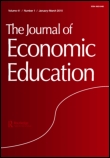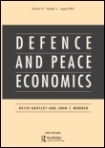Professor Vicki Knoblauch has been named an associate editor of the Economics Bulletin, an open access journal that provides extremely rapid scientific communication among research economists by publishing short, peer-reviewed papers using an accelerated review process. She has assumed responsibility for submissions in the area of collective decision making.
Faculty
Ph.D. Alumnus appointed Egyptian Finance Minister
Economics Ph.D. alumnus Al-Mursi Al-Sayed Hegazy has been named the next Egyptian Finance Minister. Prior to his appointment, Hegazy was a professor at Alexandria University, specializing in Islamic Finance. He was sworn into office on January 6.
Hegazy defended his dissertation titled “The Contribution of Oil to the Economic Development of Kuwait (1962-1981): a Macroeconomic Approach,” under the advisement of Professor William Lott, in January 1985.
Read the UConn Today article about Hegazy here.
Professor Harmon in the Journal of Economic Education
 Prof. Oskar Harmon, with his co-author Prof. James Lambrinos (Union Graduate College) had their paper Active Learning Exercises for Principles of Economics Courses” published in the Summer 2012 issue of the Journal of Economic Education (JEE). The JEE is a leading journal in the field of economic education and publishes articles on topics in teaching economics. Prof. Harmon’s article is included in the section of the journal dedicated to innovative electronic technology. In the paper Prof. Harmon and his co-author design a wiki to utilize current events and flash-based tools for instruction of concepts commonly taught in principles of economics courses.
Prof. Oskar Harmon, with his co-author Prof. James Lambrinos (Union Graduate College) had their paper Active Learning Exercises for Principles of Economics Courses” published in the Summer 2012 issue of the Journal of Economic Education (JEE). The JEE is a leading journal in the field of economic education and publishes articles on topics in teaching economics. Prof. Harmon’s article is included in the section of the journal dedicated to innovative electronic technology. In the paper Prof. Harmon and his co-author design a wiki to utilize current events and flash-based tools for instruction of concepts commonly taught in principles of economics courses.
Professors Alpert and Harmon present at AEA
![AEA[1]](https://uconnecon.files.wordpress.com/2013/01/aea1.jpg?w=300) Professor William Alpert and Professor Oskar Harmon were panel discussants in the session “The Effects of Online Economics Courses on Student Learning” and presented the paper “The Effectiveness of Interactive Online Exercises across Delivery Format”, co-authored with Professor James Lambrinos (Union Graduate College) at the American Economic Association, Annual Meetings, San Diego CA, Jan 3-6, 2013. Their paper evaluates the effectiveness of online activities controlling for delivery format. The data are from a Principles of Microeconomics class taught in three different delivery formats: traditional lecture, fully online (no in class meetings), or blended (combination of online lecture and in-class discussion. Overall the empirical estimates are consistent with the hypothesis that participation in interactive learning exercises has a positive effect on exam score at a statistically significant level. Professors Alpert and Harmon were also panel discussants in the session “The Effects of Online Economics Courses on Student Learning.”
Professor William Alpert and Professor Oskar Harmon were panel discussants in the session “The Effects of Online Economics Courses on Student Learning” and presented the paper “The Effectiveness of Interactive Online Exercises across Delivery Format”, co-authored with Professor James Lambrinos (Union Graduate College) at the American Economic Association, Annual Meetings, San Diego CA, Jan 3-6, 2013. Their paper evaluates the effectiveness of online activities controlling for delivery format. The data are from a Principles of Microeconomics class taught in three different delivery formats: traditional lecture, fully online (no in class meetings), or blended (combination of online lecture and in-class discussion. Overall the empirical estimates are consistent with the hypothesis that participation in interactive learning exercises has a positive effect on exam score at a statistically significant level. Professors Alpert and Harmon were also panel discussants in the session “The Effects of Online Economics Courses on Student Learning.”
Professor Randolph and Ph.D. candidate Patrick Flaherty on WHUS
![whuslogo[1]](https://uconnecon.files.wordpress.com/2012/12/whuslogo1.png?w=150) One of Connecticut’s National Public Radio stations, WSHU, launched a program Thursday November 28th called the “State of Disparity.” The program focuses on inequality in Connecticut. The research of Professor Susan Randolph, Emeritus Professor William Lott, and Ph.D. candidate Patrick Flaherty provided background information for the program, some of which was published in The Connecticut Economy. Both Professor Randolph and Patrick Flaherty and were interviewed by Craig LeMoult.
One of Connecticut’s National Public Radio stations, WSHU, launched a program Thursday November 28th called the “State of Disparity.” The program focuses on inequality in Connecticut. The research of Professor Susan Randolph, Emeritus Professor William Lott, and Ph.D. candidate Patrick Flaherty provided background information for the program, some of which was published in The Connecticut Economy. Both Professor Randolph and Patrick Flaherty and were interviewed by Craig LeMoult.
The launch of the program along with some sound clips from the interview can be heard on Morning Edition (See November 28th entry) can be found at the website devoted to the program: http://www.stateofdisparity.org/ .
Click below to see the two articles from The Connecticut Economy that provided background to the program.
What Drives Income Inequality Among Connecticut’s Families?
Nutmeg Haves and Have Nots: How Wide the Divide?
Professor Segerson appointed to the NAS Review Panel of the National Climate Assessment
![nca[1]](https://uconnecon.files.wordpress.com/2012/11/nca1.png?w=150) The National Climate Assessment, which is conducted every four years and submitted to the President and Congress, provides an assessment of the state of knowledge about climate change and its impacts in the U.S. The report was mandated by the 1990 Global Change Research Act. The first assessment was produced in 2000, and the next one is due to be released in 2013. By statute, before release, it must be reviewed by the National Academy of Sciences. NAS has recently put together the panel that will review the report. The 23-member panel is comprised of scholars from across the country in a wide range of fields. Professor Kathleen Segerson has been appointed as a panel member. As part of her appointment, she will be responsible for providing comments and feedback on the draft report to the U.S. Global Climate Change Research Program, which is responsible for preparing the report. After the review process is completed, the final report will be available to the public.
The National Climate Assessment, which is conducted every four years and submitted to the President and Congress, provides an assessment of the state of knowledge about climate change and its impacts in the U.S. The report was mandated by the 1990 Global Change Research Act. The first assessment was produced in 2000, and the next one is due to be released in 2013. By statute, before release, it must be reviewed by the National Academy of Sciences. NAS has recently put together the panel that will review the report. The 23-member panel is comprised of scholars from across the country in a wide range of fields. Professor Kathleen Segerson has been appointed as a panel member. As part of her appointment, she will be responsible for providing comments and feedback on the draft report to the U.S. Global Climate Change Research Program, which is responsible for preparing the report. After the review process is completed, the final report will be available to the public.
Interpreting the American Revolution as Civil War
 Professor Paul Hallwood will have a paper published in Defence and Peace Economics entitled “Quantifying Greed and Grievance in Civil Wars: The American War of Independence”. A strand in the political science literature asks ‘why do civil wars happen’? With blood diamonds in mind one possibility is greed; but in many other cases civil wars are provoked by grievances against the central power – Chechnya and Kosovo come to mind. Hallwood collects data on the cost of British Empire membership and war costs to the American colonists and passes them through his economic model to find that the Americans were over-whelmingly motivated by grievance. In over 200-years of scholarship, while some historians argue as much, others emphasize the greed hypothesis, to be rid of the economic burdens of colonial status. As one historian observed a generation ago, the debate raged on because of a lack of a scientific model to settle the dispute. Hallwood offers such a model.
Professor Paul Hallwood will have a paper published in Defence and Peace Economics entitled “Quantifying Greed and Grievance in Civil Wars: The American War of Independence”. A strand in the political science literature asks ‘why do civil wars happen’? With blood diamonds in mind one possibility is greed; but in many other cases civil wars are provoked by grievances against the central power – Chechnya and Kosovo come to mind. Hallwood collects data on the cost of British Empire membership and war costs to the American colonists and passes them through his economic model to find that the Americans were over-whelmingly motivated by grievance. In over 200-years of scholarship, while some historians argue as much, others emphasize the greed hypothesis, to be rid of the economic burdens of colonial status. As one historian observed a generation ago, the debate raged on because of a lack of a scientific model to settle the dispute. Hallwood offers such a model.
Professor Ross attends HDS 2010 Advisory Council Meeting
![]() Professor Stephen Ross attended the advisory council meeting for the 2010 Housing Discrimination Study at the Urban Institute on Nov 16th. The 2010 Housing Discrimination Study is a nationwide effort to measure the level of racial and ethnic discrimination in U.S. metropolitan areas using pairs of testers sent to the same real estate or rental agency. Professor Ross was the research director for the 2000 Housing Discrimination Study and has been a key advisor on the new study since its inception.
Professor Stephen Ross attended the advisory council meeting for the 2010 Housing Discrimination Study at the Urban Institute on Nov 16th. The 2010 Housing Discrimination Study is a nationwide effort to measure the level of racial and ethnic discrimination in U.S. metropolitan areas using pairs of testers sent to the same real estate or rental agency. Professor Ross was the research director for the 2000 Housing Discrimination Study and has been a key advisor on the new study since its inception.
Professor Prakash joins the Editorial Board of Economies
![]() Professor Nishith Prakash was recently invited to join the Editorial Board of Economies. Economies is a newly formed international scientific open access journal of development economics. In addition to reviewing manuscripts, Professor Prakash will be given the opportunity to edit a special issue on a topic closely related to his research.
Professor Nishith Prakash was recently invited to join the Editorial Board of Economies. Economies is a newly formed international scientific open access journal of development economics. In addition to reviewing manuscripts, Professor Prakash will be given the opportunity to edit a special issue on a topic closely related to his research.
Professor Harmon Presents at ITL Lunchtime Workshop
![dlc[1]](https://uconnecon.files.wordpress.com/2012/11/dlc1.png?w=150) Prof. Oskar Harmon co-presented with Professor Steven Park at the Uconn Institute of Teaching and Learning’s lunchtime workshop “Mobile Learn for Students” on Nov. 6 2012. The seminars provide an opportunity to gather with colleagues to listen, discuss, comment, interact, and reflect on a number of topics. Prof. Harmon is part of the Fall 2012 Mobile Learn pilot project exploring the capabilities of the mobile App for BlackBoard Next Generation. At the workshop Prof. Harmon discussed his experience with creating tests, announcements, and multimedia course content for mobile devices.
Prof. Oskar Harmon co-presented with Professor Steven Park at the Uconn Institute of Teaching and Learning’s lunchtime workshop “Mobile Learn for Students” on Nov. 6 2012. The seminars provide an opportunity to gather with colleagues to listen, discuss, comment, interact, and reflect on a number of topics. Prof. Harmon is part of the Fall 2012 Mobile Learn pilot project exploring the capabilities of the mobile App for BlackBoard Next Generation. At the workshop Prof. Harmon discussed his experience with creating tests, announcements, and multimedia course content for mobile devices.